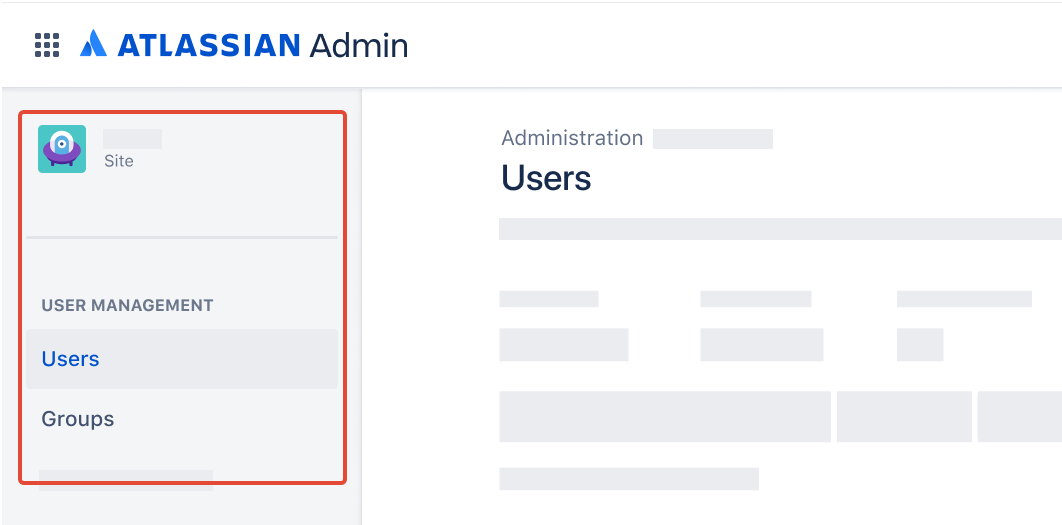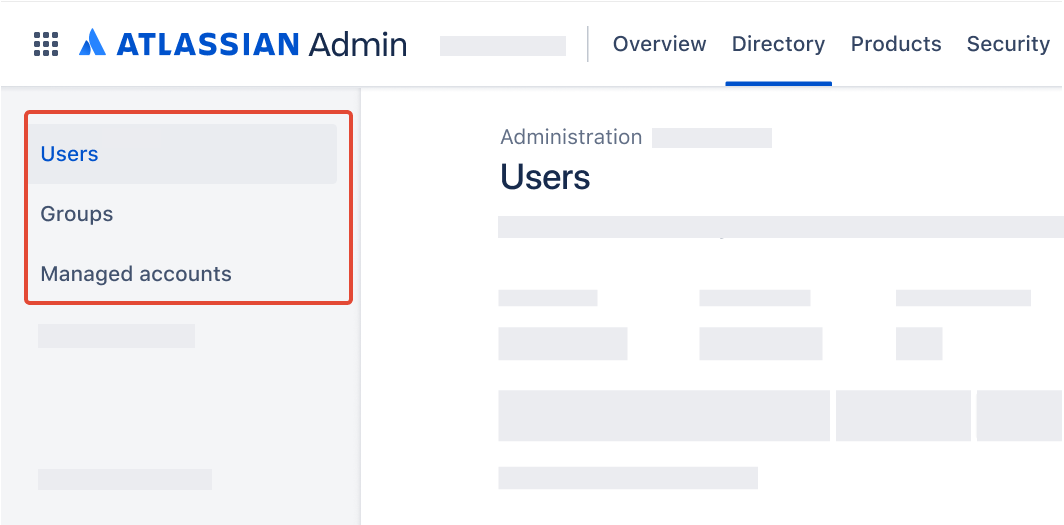Manage your organization’s Atlassian accounts
Gain control over your employee's Atlassian accounts.
Which user management experience do you have?
To check, go to your organization at admin.atlassian.com and select Directory. If the Users and Groups lists are found here, then you are using the centralized user management. Learn more about the centralized user management
Original | Centralized |
As a site administrator or organization admin, Users is found under Product site.  | As an organization admin, Users is found under Directory tab.  |
Jump to the
Where you manage your customers depends on what type of account they have. Organization admins can manage customers with Atlassian accounts. User access admins can also manage customers for specific products they’ve been assigned to.
Who can do this?
|
To manage customers with Atlassian accounts:
Go to admin.atlassian.com. Select your organization if you have more than one.
From your organization, go to Directory > Users.
Learn more managing your product users
Organization admins can also manage customers with portal-only accounts created through Jira Service Management.
Who can do this?
|
To manage customers with portal-only accounts:
Go to admin.atlassian.com. Select your organization if you have more than one.
Select Products from the header.
Under Sites and products, select the site that contains Jira Service Management.
Under Jira Service Management on the nav bar, select Portal-only customers.
Learn more about managing portal-only accounts for customers
Look at your relationship with your customers to decide which account makes sense for them. Learn more about configuring access settings for your customers
Regardless of which account type your customers have, they don't need a Jira Service Management product license to access the portals, view knowledge base articles, or send requests.
Customers with portal-only accounts can only log in to your Jira Service Management portals.
Customers with Atlassian accounts don’t consume product licenses if they are not assigned a product role.
Here's a look at the features and relationships we recommend for each type of account for your customers:
| Portal-only account | Atlassian account |
|---|---|---|
Recommended use case | Customers with this account type are typically people external to your company who seek help relating to the use of your company’s products or services. | Customers with this account type are most likely employees or partners within your company that need internal support from your teams, for example, a new employee who needs their IT workstation set up. |
Benefits | These users can:
You can configure SAML single sign-on for portal-only customers to log in to your help center. Learn how to configure single sign-on for customers If needed, you can migrate these users to an Atlassian account | In addition to the benefits of the portal-only account, you can license this type of customer for your Atlassian cloud products, including:
You can configure SAML single sign-on for Atlassian account users. Learn how to configure single sign-on for users |
Relationship | Customers who you:
You can find these customers under the Portal customers page. | Customers you collaborate with, or who may need more access in the future. You can find these customers under Users. In their profiles, in the Access section, these users have Jira Service Management - Customer enabled. If you have the centralized user management, these users have ‘Customer’ role under their product role. |
Access level | Portal-only customers can't log in at your site's root URL (for example, mysite.atlassian.net). They must use the portal's specific URL. To find this URL in your Jira Service Management project:
Portal-only customers can't access your products directly. They can only log in to your Jira Service Management portals. To create portal-only customers, add them from the Customers page in a service project. | (Optional) If required, these users can be licensed to access your Atlassian cloud products, for example, you can assign these users a product role that grants access to Jira Service Management, Jira, Confluence. Learn more about updating product access settings |
Users can be granted different customer account types depending on the customer access settings under Jira Service Management and your organization’s approved domains.
Review the customer access setting to see if it allows for the creation of Atlassian (internal) accounts:
From the top right of your screen, select Settings () > Products.
Under Jira Service Management, select Customer access.
Check if the checkbox under Internal is selected.
Learn more about the customer access settings
Review your organization’s approved domains:
Go to admin.atlassian.com. Select your organization if you have more than one.
Select Products from the header.
From the left side of the page, select User access settings > Approved domains.
Select ‘any domain’ or ‘an approved domain’ and review the following settings.
If the product role for Jira Service Management (product) is User (agent), then:
For 'any domain' that requires admin approval, the user will get a portal-only account when invited as a customer through Jira Service Management.
For an 'approved domain', the user will get the Atlassian account with the customer role when invited as a customer through Jira Service Management. Admin approval doesn't apply.
Learn more about how users get access to products
Knowledge base admins can manage permissions for who can view knowledge base articles from within the service project. Learn how to manage knowledge base permissions.
To ensure that all your portal-only customers can view knowledge base articles in the help center:
From your service project, go to Project settings > Knowledge base.
Select Who can view next to the linked space that you want to provide access to. Choose Anyone from the drop-down.
Learn how to allow anyone to view your knowledge base articles.
To allow customers to view your knowledge base articles in Confluence, you can either:
allow anonymous access to content in that space in Confluence, or
allow unlicensed access to content in that space in Confluence.
Where you manage your customers depends on what type of account they have. Organization admins and site admins can manage customers with Atlassian accounts.
Who can do this?
|
To manage customers with Atlassian accounts:
Go to admin.atlassian.com. Select your organization if you have more than one.
From your organization, go to Directory > Users.
Learn more managing your product users
Organization admins and site admins can also manage customers with portal-only accounts created through Jira Service Management.
Who can do this?
|
To manage customerss with portal-only accounts:
Go to your site's Admin at admin.atlassian.com. If you're an admin for multiple sites or an organization admin, select the site's name and URL to open the Admin for that site.
Select Jira Service Management.
Learn more about managing portal-only accounts for customers
Look at your relationship with your customers to decide which account makes sense for them. Learn more about configuring access settings for your customers
Regardless of which account type your customers have, they don't need a Jira Service Management product license to access the portals, view knowledge base articles, or send requests.
Customers with portal-only accounts can only log in to your Jira Service Management portals.
Customers with Atlassian accounts don’t consume product licenses if they are not assigned a product role.
Here's a look at the features and relationships we recommend for each type of account for your customers:
| Portal-only account | Atlassian account |
|---|---|---|
Recommended use case | Customers with this account type are typically people external to your company who seek help relating to the use of your company’s products or services. | Customers with this account type are most likely employees or partners within your company that need internal support from your teams, for example, a new employee who needs their IT workstation set up. |
Benefits | These users can:
You can configure SAML single sign-on for portal-only customers to log in to your help center. Learn how to configure single sign-on for customers If needed, you can migrate these users to an Atlassian account. | In addition to the benefits of the portal-only account, you can license this type of customer for your Atlassian cloud products, including:
You can configure SAML single sign-on for Atlassian account users. Learn how to configure single sign-on for users |
Relationship | Customers who you:
You can find these customers under the Portal customers page. | Customers you collaborate with, or who may need more access in the future. You can find these customers under Users. In their profiles, in the Access section, these users have Jira Service Management - Customer enabled. |
Access level | Portal-only customers can't log in at your site's root URL (for example, mysite.atlassian.net). They must use the portal's specific URL. To find this URL in your Jira Service Management project:
Portal-only customers can't access your products directly. They can only log in to your Jira Service Management portals. To create portal-only customers, add them from the Customers page in a service project. | (Optional) If required, these users can be licensed to access your Atlassian cloud products, for example, you can assign these users a product role that grants access to Jira Service Management, Jira, Confluence. Learn more about updating product access settings |
Users can be granted different customer account types depending on the customer access settings under Jira Service Management and your organization’s approved domains.
Review the customer access setting to see if it allows for the creation of Atlassian (internal) accounts:
From the top right of your screen, select Settings () > Products.
Under Jira Service Management, select Customer access.
Check if the checkbox under Internal is selected.
Learn more about the customer access settings
Review your organization’s approved domains:
Go to admin.atlassian.com. Select your organization if you have more than one.
Select Products from the header.
From the left side of the page, select User access settings > Approved domains.
Select ‘any domain’ or ‘an approved domain’ and review the following settings.
If the product role for Jira Service Management (product) is User (agent), then:
For 'any domain' that requires admin approval, the user will get a portal-only account when invited as a customer through Jira Service Management.
For an 'approved domain', the user will get the Atlassian account with the customer role when invited as a customer through Jira Service Management. Admin approval doesn't apply.
Learn more about how users get access to products
Knowledge base admins can manage permissions for who can view knowledge base articles from within the service project. Learn how to manage knowledge base permissions.
To ensure that all your portal-only customers can view knowledge base articles in the help center:
From your service project, go to Project settings > Knowledge base.
Select Who can view next to the linked space that you want to provide access to. Choose Anyone from the drop-down.
Learn how to allow anyone to view your knowledge base articles.
To allow customers to view your knowledge base articles in Confluence, you can either:
Was this helpful?